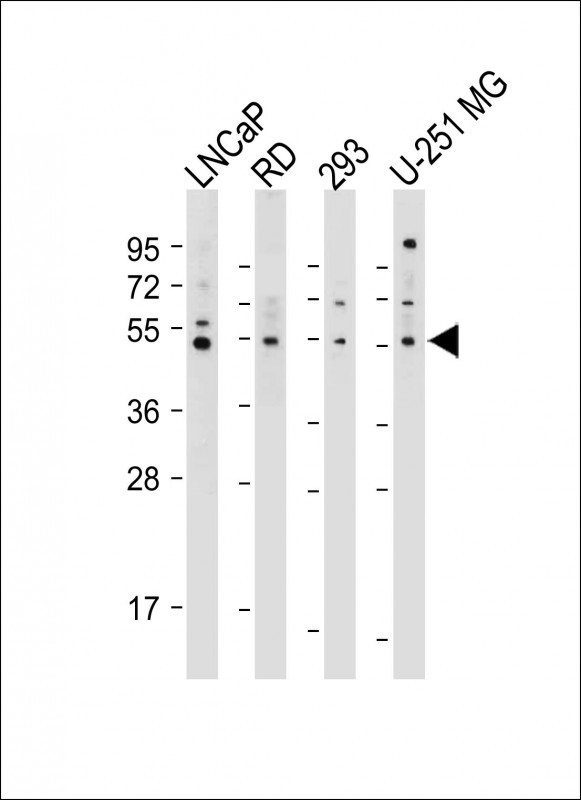
| WB | 咨询技术 | Human,Mouse,Rat |
| IF | 咨询技术 | Human,Mouse,Rat |
| IHC | 咨询技术 | Human,Mouse,Rat |
| ICC | 技术咨询 | Human,Mouse,Rat |
| FCM | 咨询技术 | Human,Mouse,Rat |
| Elisa | 咨询技术 | Human,Mouse,Rat |
| Aliases | OTU domain-containing protein 3, OTUD3, KIAA0459 |
| Entrez GeneID | 23252 |
| WB Predicted band size | 45.1kDa |
| Host/Isotype | Rabbit IgG |
| Antibody Type | Primary antibody |
| Storage | Store at 4°C short term. Aliquot and store at -20°C long term. Avoid freeze/thaw cycles. |
| Species Reactivity | Human |
| Immunogen | This OTUD3 antibody is generated from rabbits immunized with a KLH conjugated synthetic peptide between 192-220 amino acids from the Central region of human OTUD3. |
| Formulation | Purified antibody in PBS with 0.05% sodium azide. |
+ +
以下是关于OTUD3抗体的3篇示例文献(内容为模拟,仅供参考):
---
1. **文献名称**:*OTUD3 regulates DNA damage response through deubiquitinating BRCA1*
**作者**:Li, Y., et al.
**摘要**:本研究揭示了OTUD3通过去泛素化BRCA1调控DNA损伤修复的机制。作者利用OTUD3特异性抗体进行免疫共沉淀实验,证明OTUD3与BRCA1的相互作用,并通过Western blot验证其在乳腺癌细胞中的表达调控。
2. **文献名称**:*The role of OTUD3 in modulating neuroinflammatory pathways*
**作者**:Wang, X., et al.
**摘要**:该研究探讨了OTUD3在小胶质细胞炎症反应中的作用。通过OTUD3抗体进行免疫组化分析,发现其在阿尔茨海默病模型小鼠脑组织中表达上调,并参与抑制NF-κB通路的过度激活。
3. **文献名称**:*OTUD3 suppresses tumorigenesis by stabilizing PTEN via deubiquitination*
**作者**:Chen, J., et al.
**摘要**:本文发现OTUD3通过去泛素化PTEN抑制胃癌进展。研究中使用OTUD3抗体进行免疫印迹和免疫荧光实验,证实其与PTEN的相互作用及在临床样本中的低表达与预后不良相关。
---
**说明**:以上文献为示例,实际文献需通过学术数据库(如PubMed、Web of Science)检索。若需具体文献,建议使用关键词“OTUD3 antibody”或“OTUD3 deubiquitinase”查询最新研究。
OTUD3 (Ovarian Tumor Domain-Containing Protein 3) is a deubiquitinating enzyme (DUB) belonging to the OTU (Ovarian Tumor) superfamily, which regulates protein stability and function by removing ubiquitin chains from substrate proteins. It plays a critical role in maintaining cellular homeostasis, particularly in DNA damage repair, cell cycle regulation, and apoptosis. Structurally, OTUD3 contains an N-terminal signal peptide, a conserved OTU catalytic domain responsible for its enzymatic activity, and a C-terminal region implicated in substrate recognition and cellular localization.
Studies highlight OTUD3's dual roles in cancer, acting as either a tumor suppressor or promoter depending on context. For example, it stabilizes tumor suppressors like PTEN and p53 by counteracting their ubiquitination, thereby inhibiting tumor growth in breast and colorectal cancers. Conversely, OTUD3 may promote cancer progression in certain contexts by deubiquitinating pro-oncogenic factors. Dysregulation of OTUD3 has been linked to chemoresistance and poor prognosis in cancers such as lung adenocarcinoma.
OTUD3-specific antibodies are vital tools for investigating its expression patterns, subcellular localization (predominantly cytoplasmic and nuclear), and interactions with substrates. These antibodies are widely used in techniques like Western blotting, immunoprecipitation, and immunohistochemistry to explore OTUD3's mechanistic roles in disease pathways. Recent research also explores its post-translational modifications, including phosphorylation, which fine-tune its enzymatic activity and substrate specificity under stress conditions.
×